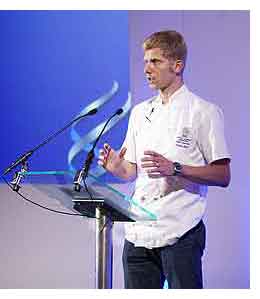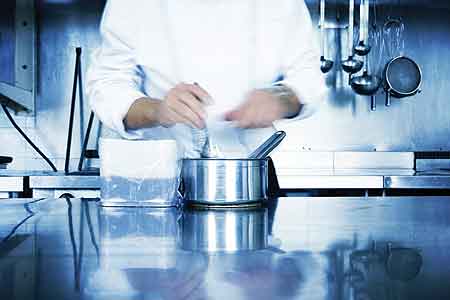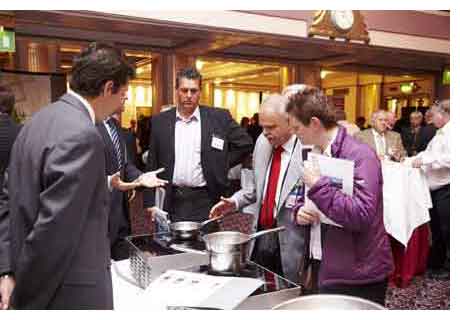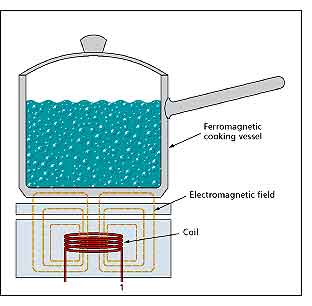Induction Forum 2011
Open gas burners and solid tops have long been favoured by chefs when choosing that workhorse of the kitchen, the cooking range. However, in an age when protecting the environment and energy efficiency are key industry considerations, induction is gaining more and more admirers, not least because it helps keep the kitchen cool.
A whole new generation of induction cooking equipment has been launched in recent years and, at the same time, costs to produce the technology have dropped. The Induction Cooking Equipment Forum, held on 10 June 2011 at the Park Lane Hotel, London, highlighted that energy savings were only the start of the opportunities the technology offers the foodservice market.
The event, organised in collaboration with the British Hospitality Association (BHA) and Caterer, was designed to provide an insight into the role that induction equipment can play in today's commercial kitchen.
Speakers included Hayden Groves, executive chef at Lloyds of London, who shared his experience of induction from the decisions to install induction equipment and how it plays a pivotal role in the operation. The Lloyds building has four very different catering outlets - a café, staff canteen, directors dining and wine bar - and all use induction in a variety of formats, including plug and play counter top units, hard-wired drop-ins and a suite in the main kitchen.
The equipment has been very reliable in the year since it has been installed, he added, and another benefit is that the induction hobs had both improved the working environment and reduced extraction costs significantly.
"We originally had four solid tops so the amount of BTUs was incredible and the extraction needed was enormous," he said. "We're now all electric. There is a bit of getting used to it but we wouldn't go back. It's second to none for me and the team."
There were also presentations from Al-Karim Govindji, technology acceleration manager at the Carbon Trust, and Lucy Johnson, policy advisor for the Sustainable Energy Using Products Team, relating to the energy used in catering facilities which, says Govindji, typically accounts for 4-6% of operating costs. Johnson underlined the importance of induction cooking equipment within the food service sector - DEFRA's own studies suggest that it offers potential energy savings of from 50-86% in commercial kitchens.
As chair of the CESA Induction Equipment Group, Steve Hobbs was well placed to give an overview of the technology and to "bust a few myths". When it was first introduced to the catering sector in the 1970s and 1980s, induction had the reputation for being expensive and unreliable. The technology has improved, costs are dropping and these days reliability is no longer an issue. As for the future, the technology is already available for a huge range of applications, from plug and play countertop units to production suites, and induction equipment will get smaller, lighter, more powerful, less expensive.
Once you have chosen your induction hob, don't leave choosing your cookware to the last minute, was the warning from the forum's final speaker, Maurits Demeyere, senior president of Demeyere Cookware, who was able to give the forum a complete survey of the pros and cons of the various choices available. For example, magnetic (18/0) stainless steel may be perfect for fast boiling of water, but it can be a bad cooking choice, as it can lead to product sticking or burning. "You can have a fantastic induction unit, but without the right cookware you won't get the best performance," he said.
Closing the forum, Keith Warren, director of CESA, said: "Just this week we've seen gas prices go up by 19%. Induction cooking equipment has been around for a long while now but its penetration is too low. It's tried and tested so let's get on and use it."
EXHIBITORS
A selection of suppliers of induction equipment exhibited the latest in induction technology.
Charvet's range of heavy-duty induction models is manufactured in Switzerland and uses remotely positioned generators to allow hobs to be placed directly over the oven.
Exclusive Ranges, in collaboration with Menu System, showed the slide control, pan detection, patented full coverage hob. The latest Menu System development is Net Comfort, allowing operators to link online to see how their range is performing and identify any service issues.
Lincat demonstrated its brand new portable countertop induction hob. Its low-profile design includes features such as twin cooking zones with variable power up to 3kW and automatic power management. The company unveiled plans for a new heavy duty induction range.
Control Induction launched new built-in wok units, ranging in power from 3kW to 8kW, and its induction solid top. The company, which also offers single to eight-ring induction stoves and planchas, says it aims to "provide everything a chef could need for surface cooking".
The E2914i induction range from Falcon recently won the UK and Ireland FCSI's top award for Sustainable Catering Equipment, combining an induction hob with a fully integrated 1/1 gastronorm compatible fan-assisted convection oven.
For Manitowoc Foodservice UK, induction is part of the company's aim to supply customers with energy-efficient, high-performance kitchens. The company's UK brands include Moorwood Vulcan, Delfield and Masterwash.
MCS Technical Products distributes the CookTek induction cooking and holding brand, specialising in induction for the food service industry. A wide range of products includes the award-winning Incogneeto buffet systems, which can be mounted under a granite surface.
Signature FSE is UK distributor for the Adventys range, which includes freestanding and inset flat and wok surface induction hobs. Adventys says the exact temperature control of its induction plancha is ideal for multiple applications, including finishing sous vide products.
Valera was among the first companies to introduce induction technology to the UK food service market. The company now offers nearly 20 different induction products including standalone countertop models for "theatre" cooking, drop-ins for servery counters and a special wok unit.
Cookware specialist Demeyere produces pots and pans using ControlInduc, a safety system that limits the maximum temperature to 250°C on compatible induction cookers. It avoids burning and makes sure that the pan remains warm, without the risk of overheating.
http://www.caterersearch.com/cesainduction" target="_blank" rel="noreferrer">www.cesa.org.uk/news-cesa-induction-guide.asp](http://www.cesa.org.uk/news-cesa-induction-guide.asp) â- To watch video highlights and see more photos, go to [www.caterersearch.com/cesainduction
WHY USE INDUCTION?
â- It's faster than a standard gas or electric hob
â- Change temperature instantly and accurately
â- It uses significantly less power
â- Lower running costs
â- It's safer
â- The flat surface is easy to wipe clean
â- A huge range of sizes and applications
â- Reduced (or no) ventilation
HOW DOES IT WORK
This means the heat is created inside the pan, as opposed to under it - as with gas or standard hobs - which is why the system is so efficient. Nothing outside the pan is affected by the induction electromagnetic field. And as soon as the pan is removed from the hob, or if the element is switched off, heat generation and energy consumption stops.
Because the energy goes straight to the pan, it's super-fast. A commercial induction hob can boil a pan of water more quickly than an electric kettle and can heat an empty induction-compatible pan up to 20°C in less than a minute.
The hob or stove top barely gets warm, except directly under the pan - where the latent heat from the pan heats the glass - so its surfaces can be much safer than standard electric or gas hobs.
Induction is a very efficient way to heat pans, and because it is so fast there's no need to preheat or have the "burner" switched on - it delivers instant heat. And even if you do leave the element switched on, if there's no pan on the hob then it will only consume approximately 0.38 watts of power per hour - virtually nothing.
Because induction only heats the pan, there's less waste heat released, which means the kitchen is cooler and the ventilation won't need to work so hard. This lack of excess heat makes induction ideal for front of house and cooking.
MYTHBUSTERS
The equipment is better, it costs less to buy and it saves more on running costs. So it's no surprise that induction cooking is gaining in popularity - but there are still a few myths that need to be debunked
I don't do induction cooking because…I need special cookware
No you don't. You just need cookware with a high ferrous content - many commercial pans are equally at home on induction as on standard gas or electric hobs.
…I can't use stainless-steel cookware
Yes you can. Even stainless-steel cookware labelled 18/8 or 18/10, which is not generally suitable for induction cooking due to the nickel content, can be used if it has a ferrous base. 18/0 stainless steel is suitable for induction cooking.
…the magnetic field is dangerous
No it's not. All the research indicates that the magnetic fields created by induction units pose no danger to users. In fact, the field is only projected about 2-3cms above the hob's surface.
…induction hobs are expensive
Induction hobs are more expensive to buy but they are so much more efficient than gas or electric hobs that their payback period can be just a few months. After which users are gaining savings every time they cook.














